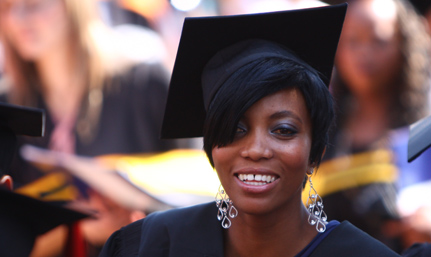|
 |
Photo: Hannes Pieterse
27 March 2013 |
The university’s Autumn Graduation Ceremony promises to be another special occasion, with speakers from South Africa and abroad that will address the graduates.
A total of 526 diplomas/certificates and 2 796 bachelor’s and honours degrees will be awarded at the ceremony. The diplomas/certificates and degrees will be awarded during eight ceremonies in the Callie Human Centre on the Bloemfontein Campus from 16 to 19 April 2013.
Well-known radio host and Idols South Africa judge, Gareth Cliff, will be the guest speaker at two ceremonies on 18 April 2013. He will be joined by Vicus Visser, the South African YouTube singing sensation dubbed Bloemfontein’s Justin Bieber. Vicus and his brother Vincent, will perform during the two ceremonies.
Graduates will also be able to draw inspiration from the American student and tap dancer, Joshua Johnson, whom overseas media report widely about. Joshua inspired American audiences with his story of hope and perseverance. The student from Penn State University travels five hours by bus to New York every weekend, where he dances on the subway train to earn money for his tuition fees.
Joshua has appeared on the Ellen DeGeneres Show and his story has also been told in the New York Times and on the American news programme ABC World News with Diane Sawyer.
Joshua will be the guest speaker at the ceremonies on 16, 17 and 19 April 2013. He will also deliver a dance item.
The programme for the respective ceremonies is:
Tuesday 16 April
09:30 Diplomas and certificates up to and including honours degrees in the Faculty of the Humanities: only Social Sciences and Communication Science.
14:30 Diplomas and certificates up to and including honours degrees in the Faculty of the Humanities: Social Sciences and Communication Science excluded.
Wednesday 17 April
09:30 Diplomas and certificates up to and including honours degrees in the Faculty of Education.
14:30 Diplomas and certificates up to and including honours degrees in the Faculties of Health Sciences, Law and Theology.
Thursday 18 April
09:30 Diplomas and certificates up to and including honours degrees in the Faculty of Natural and Agricultural Sciences: only Agricultural Sciences and Architecture.
14:30 Diplomas and certificates up to and including honours degrees in the Faculty of Natural and Agricultural Sciences: only Natural Sciences.
Friday 19 April
09:30 Diplomas and certificates up to and including honours degrees in the Faculty of Economic and Management Sciences: all diplomas and degrees in the Faculty, except BCom and BComHons.
14:30 Diplomas and certificates up to and including honours degrees in the Faculty of Economic and Management Sciences: only BCom and BComHons.
The Qwaqwa Campus’ graduation ceremony will take place on 8 June 2013. Diplomas/certificates up to and including doctorates will be awarded at this ceremony.